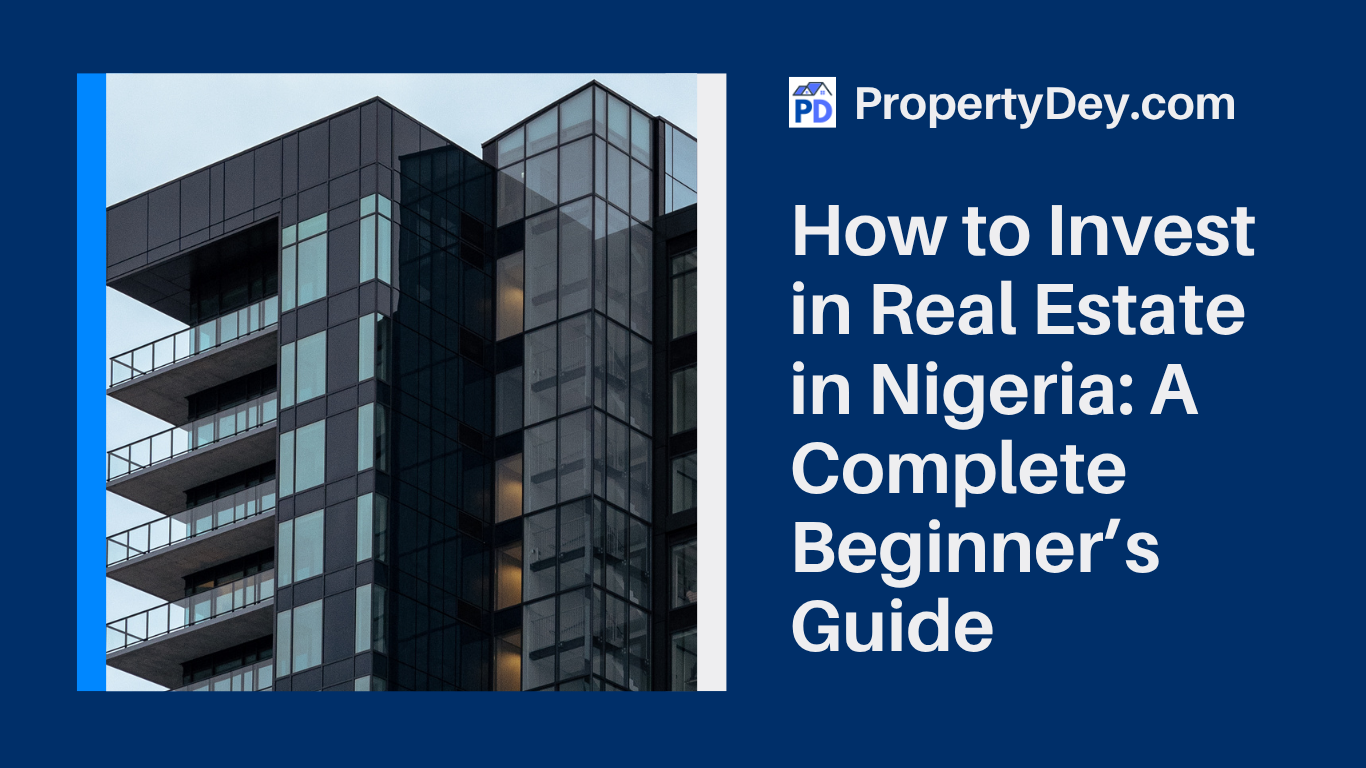How to Invest in Real Estate in Nigeria: A Complete Beginner’s Guide
If you’ve been thinking about investing in real estate in Nigeria, you’re not alone. More Nigerians, both at home and abroad are turning to property as a secure way to grow wealth, protect against inflation, and create long-term income.
Before we dive deep, here’s a quick, direct answer for anyone searching online.
Quick Answer: How to Invest in Real Estate in Nigeria
To invest in real estate in Nigeria, follow these steps:
- Set Your Budget – Include purchase price, legal, and survey fees.
- Choose a Growth Location – Target areas with upcoming infrastructure.
- Verify Documents – Look for C of O, Governor’s Consent, or R of O.
- Use Trusted Agents or Platforms – e.g., PropertyDay.com.
- Get Legal Support – Hire a property lawyer before signing contracts.
- Plan Your Strategy – Decide between land banking, rentals, commercial property, or off-plan.
Best beginner option: Land banking in developing areas — it’s low maintenance and offers strong appreciation.
Why Real Estate in Nigeria is Worth Your Time
Here’s why the Nigerian property market attracts both locals and the diaspora:
- Booming Population: Over 200 million people means constant housing demand.
- Fast Appreciation: Prime land can double in value in just a few years.
- Steady Income: Rental properties bring monthly returns.
- Inflation Protection: Property holds value better than cash.
You can explore current opportunities here: Land for Sale in Nigeria.
Best Ways to Invest in Real Estate in Nigeria
1. Land Banking (Buying and Holding Land)
This is one of the safest and most profitable strategies. You buy land in an emerging area, wait for development to increase demand, then sell at a higher price.
Example: Investors who bought land near Lekki Free Trade Zone before the Dangote Refinery announcement saw massive gains.
Learn how to avoid scams in our Guide to Buying Land in Nigeria.
2. Rental Properties
Buying a house, apartment, or duplex in cities like Lagos, Abuja, or Port Harcourt and renting it out can generate steady income.
3. Commercial Properties
Office spaces, warehouses, and retail outlets often have higher returns, especially in busy business districts.
4. Off-Plan Investments
Purchasing during construction means lower prices and potentially high resale value after completion. Only buy from Verified Developers to avoid risk.
5. Real Estate Investment Trusts (REITs)
If you want passive exposure, invest in REITs listed on the Nigerian Exchange Group to earn property income without direct ownership.
Step-by-Step: How to Start Investing
- Decide Your Budget – Don’t forget survey, legal, and development fees.
- Pick the Right Location – Look for infrastructure growth potential.
- Verify Documents – Only buy with valid titles like C of O or Governor’s Consent.
- Work with Trusted Professionals – Use platforms like PropertyDay.com.
- Get Legal Help – Always use a property lawyer.
- Plan Your Exit – Will you rent, flip, or hold?
Common Mistakes to Avoid
- Skipping document verification at the Ministry of Lands.
- Falling for deals that seem “too good to be true.”
- Buying in areas with no development plans.
- Avoiding legal fees (which can cost more later).
FAQs
Q: Can I invest from abroad?
Yes, many Nigerians in the diaspora invest through verified portals like PropertyDay.com.
Q: Is land better than houses?
Land usually appreciates faster, but rentals bring steady income.
Q: How do I avoid scams?
Verify documents, work with trusted platforms, and hire a lawyer.
Final Word
Real estate in Nigeria can be life-changing if done right. Whether you start with land banking, rentals, or commercial property, the key is research, verification, and trusted partners.
When you’re ready, explore PropertyDay.com for genuine listings and opportunities vetted for safety and value.






2 comments
30 Strategies to Become a Top Real Estate Agent in Nigeria in Few Months - propertydey.com
[…] 📌 Land Banking in Nigeria: A Beginner’s Guide […]
30 Strategies to Become a Top Real Estate Agent in Nigeria - propertydey.com
[…] 📌 Land Banking in Nigeria: A Beginner’s Guide […]